2025 CFUW AWARD WINNERS-ELI DUNLAP & NICK LUNDRIGAN
This year, there were two recipients for the CFUW Award. Eli Dunlap was a co-recipient for their project #Searchthelandfill, which the judges describe as “a deep meditation on the loss of Indigenous women whose remains were recovered from Winnipeg-area landfills, and a powerful connection to the broader crisis of Missing and Murdered Indigenous Women in this country.
Nick Lundrigan was the other co-recipient for their paper, “Alice is a Friend of Dorothy: Queer Allegory in Wonderland and Oz,” which the judges assessed as “a superb example of a comparative literary analysis, in this case between the work of Lewis Carroll and L. Frank Baum, exploring the use of queer language in these classic stories.”
Anne MacInnis, President of the Wolfville Chapter of the CFUW, and two other members attended the award presentations that took place at Acadia University on 17 April, 2025.
Congratulations to both winners from the members of the Selection Committee: Drs. Rabindra Chaulagain, Emily Lockhart, Katie Mazer, and Randy Newman.
2024 CFUW AWARD WINNER - Hanna McCamon

I grew up in the Annapolis Valley and attended a local high school before coming to Acadia University. I began my studies in the Psychology program, however, transferred to the Department of Sociology the first day of my second year. In May 2025, I will graduate with an BA Honours in Sociology, with a minor in History. My honours thesis titled, “‘Meanings of Home’: The Reproduced Limitations and Vulnerability of Housing Insecurity for University Students,” which explores student’s struggles with finding and maintaining off-campus housing. This project additionally ties into concepts of gender, race, and class divides, demonstrating my passion for social justice.
I am the Events and Fundraising Coordinator for the Acadia University Sociology Society, where we actively engage with students in Sociology and Women and Gender Studies and build community. In September 2025, I will be pursuing a Master of Arts in Sociology.
PROJECT:
My project is a final paper for SOCI 2103 (Dr. Rabindra Chaulagain) titled, “Redefining Freedom: The Falsified Consciousness of Feminism (A Socially Theoretical Response to Women's Emancipation).” This paper reflects on the writings of Emma Goldman, a political activist and revolutionary. This paper tied the arguments of Smith with modern day examples and evidence of women’s subordination, as well as personal anecdotes. My goal was to not only produce an end-of-term paper, but to actively engage in critical theory to exemplify how society has been disillusioned about their freedoms, especially in gendered discourses.
2023 CFUW AWARD WINNER - Cameron Barnard
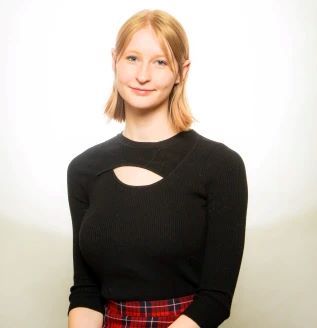
I was born and raised in South Africa. I was homeschooled for eight years before my family and I moved to Wolfville, Nova Scotia, in 2020. I then completed my last year of high school and entered straight into Acadia University. I am a double major in Classics & Biology, where I am just finishing my second year and preparing to graduate with honours in 2025.
I also founded and run the American Sign Language (ASL) club on campus and I’m an executive for the History & Classics society. I plan on becoming a bioarchaeologist where I can focus on both material cultures and organic remains from ancient societies in order to rebuild their stories and give a voice back to their narrative.
PROJECT:
My project is a webpage, “The Iconography of Women on Attic Pottery,” uploaded on a larger website, Women in Antiquity. The website is hosted by Dr. Chelsea Gardner and the project was completed for her class Gender and Sexuality in the Greco-Roman World. The project had to focus on an aspect of women or womanhood in antiquity. My topic, focusing on women depicted on Athenian pottery, specifically showcases depictions of female friendship, motherhood, labour, and female roles during important societal events that aren’t often found in literary sources. My goal was to stress the importance of what evidence we can find of women in material cultures, how relevant and valuable they were to Greek society, as well as bring attention to the stories of these women that are often neglected by modern scholarship.
2022 CFUW AWARD WINNER
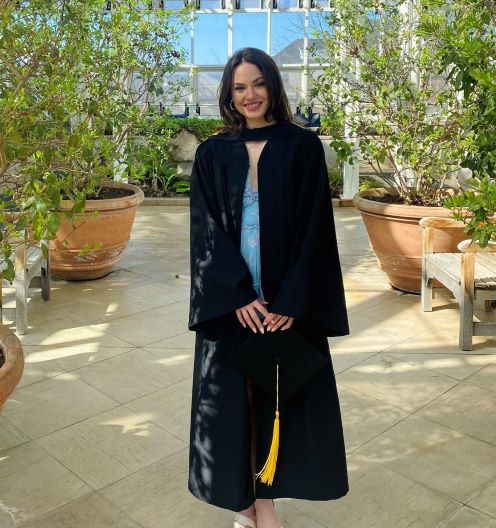
Tessa Firth, who is completing a Bachelor of Science double major in Biology and Kinesiology, is the recipient of the CFUW Award for the scholarly work and activism she has demonstrated in her project, Girls Walk Forward. The intersectional project has generated a program based on community and solidarity. Tessa Firth contextualized her project as follows:
The COVID-19 pandemic paused community out-reach programs for several months, forcing people to stay home and adjust to a greater isolated lifestyle. This affected vulnerable populations, including young girls, who experienced greater social isolation and were forced to adjust to online learning, often creating higher levels of anxiety. After pandemic restrictions were lifted, it was important for this population to have a place to relieve those anxieties while returning to in-person school learning. The goal of the project was to create a safe space for youth where they could make connections with mentors who had experienced going through many of the same situations as them. The project was funded by the Nova Scotia Status of Women and it has partnered with Big Brothers Big Sisters Annapolis, which has provided training and liability screening for Girls Walk Forward mentors. Girls Walk Forward is up and running: members meet on a weekly basis, while going for walks outside and talking about issues faced by youth as they transition into young adulthood.
The CFUW Award Committee wishes to thank the other eight students who took the time to prepare and submit their projects despite yet another challenging year.
2021 CFUW WINNER
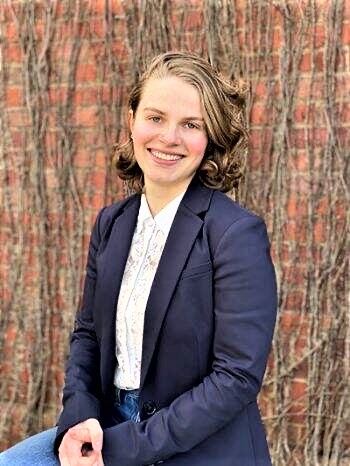
Margaret Hopkins, who is completing an Honours degree in Mathematics and Statistics and a Bachelor in Music, is the 2021 recipient of the CFUW Award for her scholarly work, “Control Freak: Power dynamics and subversion in Barbara Hannigan’s performances of György Ligeti’s Mysteries of the Macabre.” Margaret Hopkins argues that Hannigan subverts gendered expectations of women classical musicians to claim a role traditionally occupied by male conductors. Her project focuses on two of Hannigan’s most recognizable costumes: her black patent leather outfit, reminiscent of a dominatrix, and her “naughty schoolgirl” outfit. These outfits both embody specific power dynamics that subvert the audience’s understanding of the ways in which female classical musicians present themselves onstage and, in the case of her dominatrix outfit, confound traditional criticisms of women conductors. Hannigan approaches this subversion in a way that is consistent with the spirit in which Ligeti wrote Le Grand Macabre, which was itself simultaneously a rejection of modernist opera and a parody of traditional opera.
The CFUW Award Committee wishes to thank the other eight students who took the time to prepare and submit their projects despite a challenging year.
2020 CFUW Winner
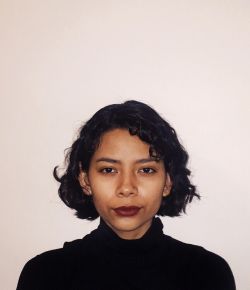
Afnan Farooqui, an honours student in the Department of History and Classics, is the 2020 recipient of the CFUW Award for her scholarly work, “Where is the Glory: African American Women Reformers and the Struggle for Freedom in the Progressive Era”. The paper examines the role of African American clubwomen during the Progressive era, particularly their influence and role in black activism and the struggle for enfranchisement of black women. By examining organizations such as the National Association for Colored Women (NACW) and figures such as Ida B. Wells and Mary Church Terrell, Farooqui expertly guides the reader to consider the nature of African American women reformers’ resistance.
Two other finalists were also recognized for their excellent scholarly submissions: Sami Mackenzie (WGST, Sociology) for her paper, “Trying to Find a Modern Way: Religious Practices and Acts of Resistance Among Queer Feminist Christian Women,” and Erin Norris (Psychology) for her paper, “Into the Unknown: Exploring the Association Between Uncertainty and Intimate Partner Violence.”
The adjudication committee was greatly impressed by the quality and breadth of all twelve submissions received.
2019 CFUW Winner
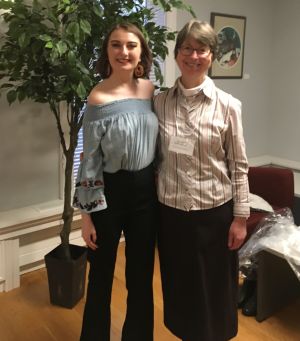
The winner of this year’s CFUW Award is Kelsey MacGowan, a Major in History. Her project, “Tully Untamed,” discussed the achievements of three women who graduated at Acadia University in 1916. Focusing on fashion, her project examined the tension between norms of femininity and scholarly achievement in the lives of Esther Clark Wright, Lillian Chase, and Bessie Lockhart. The picture features Kelsey and the President of CFUW, Heather Pineo Regan.
2018 CFUW Winner
Laura Fischer wins the 2018 CFUW Award for the presentation of her project, “Murdered and Missing Indigenous Women in Canada: Activism, Research, and an Awareness Campaign.” The runners-up are Renee Bujold, who presented on “The Importance of Traditional Foodways and their Role in Maintaining the Health of Mi’kmaq Women” and Mariah Skater, who presented on “Gender and Mental Health Disorders in Young to Middle-Aged Adults.” Congratulations to the three presenters for excellent presentations.
2017 CFUW Winner
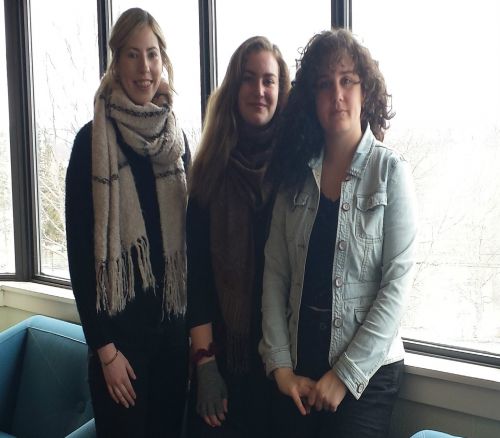
Ellen Torrie is the winner of the 2017 CFUW award. Tzomi Burkhart and Erica Marrison were awarded second and third place, respectively.
2016 CFUW WINNER
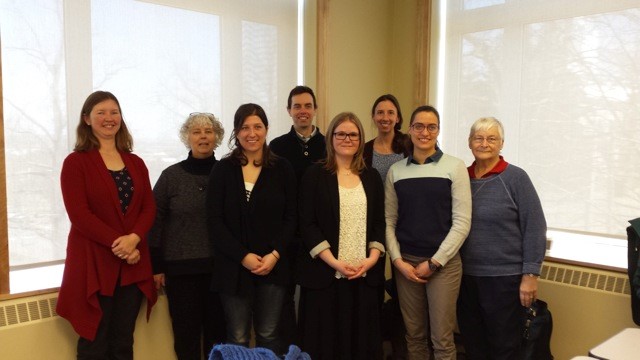
Samantta Villanueva is the winner of this year's Award for her health promotion program entitled, "Addressing Sexual Assault at Acadia." The program is designed to address the negative health effects of sexual assault, specifically on university campuses, and she will be working with the Women's Centre and other campus groups with a view to implementing the program in future. It was developed as a major project for PSYC 3193: Health Psychology with Dr. Anne Sophie Champod who asked students to create a health promotion program for a specific population of at-risk individuals. Samantta’s program is aimed at decreasing the negative health outcomes associated with sexual assault by addressing rape culture on campus. She proposes to run a Sexual Assault Education Session to foster consent culture on campus in order to decrease instances of and negative outcomes associated with sexual assault. Based on the literature regarding perpetuation of sexual assaults on campus, the following six session objectives were created:
- To dispel rape myths that allow the perpetration of sexual assault,
- To define sexual assault, sexual coercion and similar terms so that instances of sexual assault or coercion can be easily recognized,
- To emphasize the consequences to perpetrators and create awareness of the seriousness of the act and legal implications,
- To acknowledge the outcomes for victims in order to elicit victim empathy which might decrease rates,
- To refocus discourse and acknowledge that negative outcomes of sexual assault are produced by perpetrators and not by victims,
- And to teach bystander intervention to increase participants’ self-efficacy and feelings of personal responsibility for the solution.
Evidence on the effectiveness of similar campaigns at other universities was reviewed and health psychology concepts and theories were applied to specific aspects of the proposed session. These include attitude-change techniques and behavior-change techniques, and procedures regarding the measurement of the outcome of the session.
Although she is graduating, Samantta plans to work with the Women’s Centre and other campus groups through the summer and into the fall to implement the program. She will develop the specific session activities further and recruit presenters and guest speakers. Samantta notes that, although this project was born from an examination of the health consequences associated with sexual assault, sexual assault is more than a health issue; it is a gender-based issue that is entrenched in patriarchal thinking, misogyny and sexism. This project will greatly benefit the campus community by addressing rape culture and creating a safe environment for all students.
This year there were nine applications from students in a variety of disciplines. The other two short-listed projects were by Jenna Colclough, "Acadia Seminary students who enlisted with the Canadian Armed Medical Corps as Nursing Sisters during WWI", and Robyn Venema, "Acadia Anti-Slavery Week Campaign". The Award Committee were impressed with the quality and variety of the applications, congratulates everyone for their projects, and thanks them all for participating.
2015 CFUW WINNER
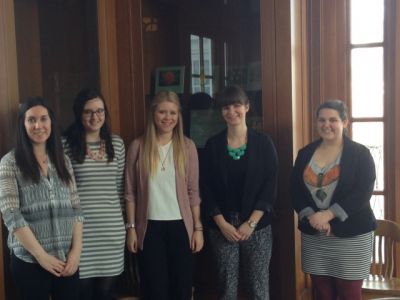
Congratulations to Nadia Champion (History, WGS) winner of the 2014-15 CFUW Wolfville Award
Nadia won this year's award for a paper entitled, “The Aftermath of Widespread Genocide Sexual Violence on the Women of Rwanda.” Nadia is a double major in History and Women’s and Gender Studies and wrote this paper as an assignment for Dr. Jamie Sedgwick’s course, HIST 3693 Genocide & Justice. She was inspired to learn more about Rwanda after attending a lecture by Romeo Dallaire, former Force Commander for the United Nations Assistance Mission for Rwanda. Her paper aims to outline the many ways in which female survivors of sexual violence continue to struggle in post-genocide Rwanda. She examines the social, psychological, and physical repercussions of brutal, widespread sexual violence and argues that Rwanda’s largely patriarchal society exacerbates and/or creates many hardships. On top of having lived through genocide and losing loved ones, Rwandan women face becoming head-of-the-household, difficult experiences prosecuting rape in the ICTR and Gacaca Courts, deteriorating mental health, concerns regarding marriage, physical trauma, and the loss of a community of women. Through the utilization of secondary and especially primary sources, Nadia hopes that individual voices of courage and endurance will be heard even through the pain, suffering, and loss which accompanies many of these women’s stories.
Nadia also argues that the Rwandan story has global resonance since it relates to larger communities of concern for women all over the world. Wartime sexual violence against women has been used for centuries and has been taking place likely longer than we can account for. There are a large number of reasons for this, including but not limited to: the humiliation of the opposing side, endangering reproduction capacity, and as a means of psychological damage. Sexual violence is particularly used during genocides in a purposeful way to aid in the destruction of future generations. Although not used exclusively against women, this is a tactic that tends to be perpetrated more frequently against women. In order to stop wartime sexual violence it is essential to ensure that women who have lived through this have their experiences understood, their needs met, and are not forgotten. Often after a large-scale atrocity ends it is felt that the suffering is over and survivors of sexual violence can be forgotten, especially due to the silence which many feel they have to live with. Without acknowledging and attempting to understand the experiences of these women, Nadia argues that there can never be a full understanding of, or ability to prevent, wartime sexual violence all over the world.
There were nine applications year, from a variety of disciplines. The other two short-listed projects were Megan Sim, State Sponsored Violence: Missing and Murdered Aboriginal Women in Canada and Kate Dalrymple, Nora Allen and Vicki Archer, Mind the Gap: Exploring the Orgasm Gap and Inequity in the Sexual Satisfaction of University Students. The Award Committee wishes to commend everyone for their projects, and thank them all for participating.
2014 CFUW WINNERS
Congratulations to Nicole Ali and Cara Rossiter, co-winners of the 2013-14 CFUW Wolfville Award.
Nicole Ali is studying for a BSc Honours in Psychology and next year will write her thesis examining homecare in the Annapolis Valley; Cara Rossiter is in the last year of her BA Honours in English. Nicole won for her project on “Trends of Alcohol and Sex in Popular Music Lyrics”; Cara won for her project on “Marriage and Class as Regulating Institutions in John Lyly’s Gallathea and William Shakespeare’s A Midsummer Night’s Dream.”
Considering the recent controversy around Robin Thicke’s song Blurred Lines, Nicole Ali thought it would be interesting to look at whether song lyrics portrayed the message that it is socially acceptable and normal to combine alcohol and sex. Further, she sought to examine whether the implication was that alcohol preceded or facilitated sex. Given that Canadian law states that it is illegal to have sexual intercourse or perform sexual acts with someone without their consent and that consent cannot be given by someone who is incapacitated, messages that alcohol and sex go together are not only dangerous, but may encourage unacceptable behaviour. Drawing on extensive research, Nicole’s project considers the gender stereotyped roles which imply that women are “gatekeepers” of their sexuality and that it is normal for men to “aggressively” pursue women. Not only are these stereotypes sexist and unfair, but they play a role in the underreporting of sexual assault because women often receive the message that their sexual assault is not “real” and/or that society will look down on them for allowing themselves to be a victim, rather than the male who sexually assaulted them. The findings of Ali’s study suggest that “rape culture” is a social issue present in our society that is sometimes supported in media such as popular music. Given that the majority of sexual assaults are occurring to women under the age of 24, the growing number of song lyrics containing the message that alcohol and sex go together may be dangerously influential for young women in our society.
In her project, Cara Rossiter examines how John Lyly’s Gallathea and William Shakespeare’s A Midsummer Night’s Dream support traditional patriarchal values, although audiences and readers often consider these plays to be quite subversive. In Gallathea, the two female characters, Gallathea and Phillida, prove gender’s malleability as they dress as boys. Each understanding the other to be a boy, Gallathea and Phillida fall in love. This question of homosexuality is more problematic in Lyly’s play. He promptly resolves this by having the divine characters transform one of the women into a man, allowing the two to be married and restoring the patriarchal, heteronormative order. Marriage also restores order in A Midsummer Night’s Dream. At first glance, Hermia seems to subvert patriarchal power by refusing to marry Demetrius and asserting her love for Lysander. However, Theseus, the ultimate symbol of patriarchal power in the play, persists in asserting his power. He tames Hippolyta, the Amazon woman and emblem of feminine power, and even controls the marriages of the four lovers. Cara completes her project by suggesting that ambiguous signs of patriarchy persist in current western culture. Certain popular sources of entertainment, such as Cosmopolitan magazine, present particular ideas as being “feminist” and “liberating.” However, upon closer examination, one realizes that these particular ideas actually reinforce a patriarchal regime in which women are limited to a particular definition of femininity.
The WGST Award Committee wishes to underline the quality and the interdisciplinary variety of the projects that were submitted. There were 9 applications this year from the following programs: Education, English (4 projects), History, Kinesiology, Nutrition, and Psychology. We thank all the students who submitted their projects, and the faculty members who supported their students. The other two finalist projects were presented by Jasmine Hare (Education) on “Bright Ideas for Teaching Social Studies: The Famous Five,” and Sara Burrill and James Wilson (Nutrition) on “Exploring the Barriers to Breastfeeding.”
2013 CFUW Winner
Congratulations to Marianna Chapman, the winner of the 2012-13 CFUW Wolfville Award.
Marianna is in the last year of her BA in Music Composition and won for a project inspired by the music of Barbara Pentland, a twentieth-century Canadian female composer. Marianna’s composition for voice and piano is entitled "A Testament of Autonomy," the lyrics for which are drawn from Mary Wollstonecraft's, "A Vindication of the Rights of Woman" (1792). Marianna was struck by the connection between the generations of women represented by Wollstonecraft and Pentland, and the example they set for young women like herself in male-dominated careers. Marianna says that although Pentland’s music was critically acclaimed, she never gained wide popularity. Even so, Pentland still “continued to write music how she wanted to write it, all the while ignoring those boundaries that being a woman had imposed upon her. I hope that in some way my piece will remind us as women to not let limitations be placed on us or our work, and for that matter on other women around us.” Marianna’s composition was performed in Halifax at The Music Room on November 25, 2012 at a concert organized by Vocalypse Productions in honour of what would have been Barbara Pentland’s 100th birthday. An audio file of the performance, featuring the voice of Kate Corrigan, soprano, and pianist Andrei Dandridge-Evancio, both students of the Acadia School of Music, can be heard HERE.
There were a total of seven applications this year, in a wide variety of media, making the judges’ task a difficult one. The two other finalists were projects from Amelia Gallant and a joint project by Callie Lathem and Emma Cochrane. Amelia created a series of self-esteem workshop activities designed to promote “Self-Positive Personalities & Self-Aware Attitudes” for girls aged 9-11. Callie and Emma coordinated the very successful “Sex-Fest 2012” to raise awareness and generate dialogue on campus about sexual health, sexual violence, gender, and sexual orientation. Other entries included a YouTube ‘rant’ about attacks on women’s reproductive rights, term papers on teen pregnancy and body image, and a public history exhibit on the politics of naming.
2012 CFUW Winners
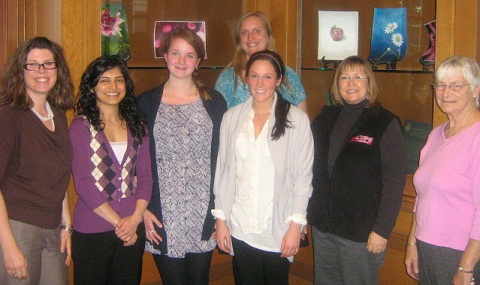
Emma Cochrane (Political Science '13) and Stephanie Chapman (Sociology '12) were the 2012 winners of the CFUW award for their outstanding contributions to the Acadia community through their work creating the student group "Acadia Students for Enthusiastic Consent." Through their efforts, they have spearheaded a student movement to address the problem of sexual assault at Acadia, which has led to significant changes on campus. Their efforts have included the creation of a forum to discuss the extent of the problem here and solutions to it, which brought out over 60 students and many faculty. They also contributed to the creation of a two-page center spread in the Valentine's Day issue of the Athenaeum, to help raise awareness about sexual assault. Sexual Assault awareness will also be a new component of frosh week training and there has been a brochure created and websites have been updated by the new Equity Officer and Safety & Security so students now have a resource at hand to know what to do should they be assaulted. Emma and Stef will be continuing their work next year, in concert with the Women's Centre, with an ad campaign aimed at spreading the word that enthusiastic consent is the only consent.
This year's competition was particularly strong with 7 applications from 8 students. Our two other semi-finalists were Megan Muise (BA hons Sociology/Minor WGS '13) for her poem "Violence Doesn't See" which was created for her WGST 3023 Feminist Theory class 'zine and was read at the December 6th commemoration of the Montreal Massacre, and Megan MacCormac for her paper documenting the life of Sister Mary MacCormack a pioneer of education for women in Quebec in the 1960s. Other entries included a website addressing women's symptoms of a heart attack, term papers on slut walks and gender inequality in sports coverage in the media, and choreography from the Women of Wolfville show. The committee was very impressed by all of the entries and are eager to see what students come up with for next year.
2011 CFUW Award Winner
A big congratulations to this year’s CFUW Award Winner, Megan MacCormac. Megan, a Sociology Honours student taking WGST 2906 (Women and Gender in the Modern World), won for her essay: “Empowerment of Haitian Women: Grassroots Development for Change”. Her presentation was a hit at the CFUW meeting and that they had lots of questions regarding her work in Haiti.
This year we had a large number of submissions, including art, websites, essays, research, and more, to a total of 9 submissions. It was a tough competition but a delight to read/see them all. Thanks to Shilpa Dogra, Anna Kiefte, Barb Moore, and Winnie Horton for serving on the committee and thanks to the CFUW for their generous contribution of $1,500 each year for the prize.
CFUW Women's and Gender Studies Award, 2010
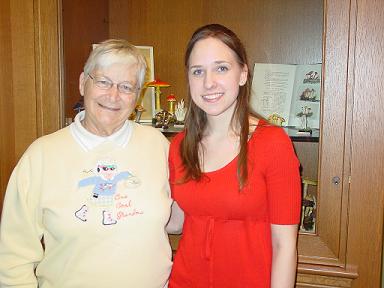
The 2010 award winner was Holly Woodworth, a Women's and Gender Studies Honours student. Her project is to write a life history of the Women's and Gender Studies program at Acadia, which delves into its origins in the 1970s through to today. Congratulations to Holly! The $1500 award was presented to Holly by Winnie Horton of the CFUW Wolfville, and Holly was invited to present her project to a CFUW meeting on March 24th.
2006 - 2009 WGST Award Winners
The 2009 CFUW award winner was Tracy Tidgwell, who graduated with joint honours in Sociology and Women's and Gender Studies. Her project involved the creation of the Valley Youth Project which is a drop-in program for Lesbian, Gay, Bisexual, Transgendered, Queer, and Questioning youth in the Annapolis Valley. More information about the Valley Youth Project can be found at their facebook page: http://www.facebook.com/pages/Valley-Youth-Project/22418494995.
The CFUW Wolfville Women’s & Gender Studies award for 2008 was presented to Katherine Akerman, an Honours student in the Department of History & Classics. Her winning project involved archiving the Minute Books kept by the Grand Pré Women’s Institutes from 1913 to 1999 in order that they can be made accessible to researchers from across the country. In addition, Katherine wrote a scholarly article entitled “More than Juicy Gossip: The Grand Pré Women’s Institute” in which she examines the numerous community projects engaged in by the WI. She will be presenting her findings in talks given to the Women’s Institute and other interested organizations, and also plans to disseminate her work through the WI newsletter and at future academic conferences.
The other two finalists were Emily West (Honours, Sociology) and Ryan Gessner (Honours, Physics). Emily’s project was entitled “Overcoming Barriers: A Preventive and Holistic Health Awareness Workshop for Women,” which examined the implications of professionalization, feminization and alternative medicine. Working with Valley naturopaths, Emily has organized a workshop to promote and facilitate the feminist aspects of naturopathic care for women in need. Ryan’s project, entitled “Radon Education in the Annapolis Valley: A Community Outreach Project,” examined the health risks of radon gas and provided local secondary school students with the opportunity of engaging in a hands-on research project testing the level of radon gas in their homes.
The recipients for the 2006-2007 award were Carissa Corkum and Krystle Oickle. Their project was created for NUTR 4513 Nutrition in Health/Development for which they created a web site, poster display and information pamphlets about the effects of gender inequalities on nutrition in developing countries
The recipient for 2005-2006 was Steve Schiffer, who was enrolled in POLS 2706 The Politics of Difference. Steve's project was on women's access to start-up loans and was prepared for the Chrysalis House, Kentville.
